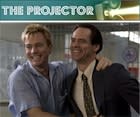Review: ‘I Love You, Phillip Morris’
%photo13% 1. "I Love You, Phillip Morris" is a chaotic mess of a movie, about seven different movies in one, sometimes switching from scene-to-scene. Let's see if I can count them all: Screwball comedy, warm love story, prison break heist, tearjerker, character study, legal drama and uplifting ode to being a free human being. (There's also sporadically appearing and reappearing narration, just to make sure the movie doesn't miss anything.) I'm sure I'm missing a few. Ordinarily, this would be the sign of an unfocused jumble of a movie, and in a way, it kind of is. I still couldn't help but kind of love it. This is a movie that has a bigger heart than it knows what to do with.
2. The first 15 minutes of the film give you little idea of what you're in for. We meet Steven Russell, a small-town Texas cop who goes to church and raises a family and smiles a lot at barbecues. It turns out that he's a con man and secretly gay, which Carrey mugs to the hilt. Carrey's off in these first scenes, and so is the film: It seems to think it's a wacky situational comedy, and Carrey overplays everything in a way that's concerning. The movie doesn't seem to be taking its characters and its story very seriously -- it doesn't miss a chance to make fun of small-town values and those dumb idiots who might actually believe in God -- and I found myself distressed: This is going to be one of those those kind of movies. But I couldn't have known how many gear shifts this movie would be going through.
3. Eventually, Russell is busted for theft and sent to jail, and the movie suddenly snaps to attention. There, he meets the Phillip Morris of the title, played with the sort of doe-eyed innocence and charm that it seems only Ewan McGregor is capable of making you believe, and before we know it, we're in the midst of a legitimately compelling love story. At the risk of sounding glib, Carrey and McGregor have a real chemistry together: Their electricity and geniune, if inexplicable, love for each other spins the movie off in a wild new direction. It settles Carrey's performance down too: He corrals that spastic energy and focuses it directly on McGregor, to surprisingly affecting results. Before you know it, you're rooting for these two to figure out a way to end up together. I don't remember the last time I was so invested in the relationship of two characters in a "mainstream" romantic comedy: There's a giddy desperation to both Carrey and McGregor that's disorienting. It's a blinding blast of light out of nowhere.
4. What's interesting is that we don't know much about Russell or Morris; that's also part of the charm. They don't know much about each other (or themselves) either. This becomes a problem when they make it out of jail, as Russell finds himself falling back into the life of a con man again. The movie never resolves whether or not Russell is mentally inbalanced or just genetically dispositioned toward trouble, but it doesn't really matter: He impersonates a Chief Financial Officer of a company -- quite well, I might add; one of the movie's few quiet jokes is that in a different life, Russell would be the type of bootstrap entrepreneur this country loves -- but ends up embezzling funds and landing back in jail again. (He, not unwittingly, ends up getting Morris back in jail too; he simply can't be without him.) Once he's there, separated from Morris, he keeps finding new ways to escape, before being caught, and then escaping again. (This is why the true story of Russell has become such a renowned case.) Most audaciously, he impersonates a dying AIDS patient, rather magnificently. Carrey is at his best at this point, as a man who is full of manure, doesn't know why and doesn't care: All he knows is that he needs Morris. Carrey's mannerisms are both limber and taut here. He is a man on a perpetual mission, whatever it is.
5. There's so much wrong with this movie that it'd be difficult to enumerate all the problems; directors Glenn Ficarra and John Requa (who wrote "Bad Santa") have no basic understanding of tone, pace or rhythm. (There's a particularly galling scene where Russell cries while saying goodbye to a dying old lover that has no relevance whatsoever and might have been beamed in from a Mexican soap opera.) They don't really dig into what makes Russell tick and eventually just throw up their hands with a "I don't know why I do the things I do" narration that feels like an apology. Maybe this is by design, or maybe it isn't. I don't care, because the movie isn't ultimately about Russell's escapes or his cons or even what's going in his head. It's about Russell and Morris, and the insanity of realizing, for no apparent reason, that you love another person -- however that "love" may be defined -- and how wonderfully debilitating that obsession really can be. Ficarra and Requa honed on the one part of their story that really matters, and it wipes everything else, all the other problems, off the screen like ash. This is one fevered, huge-souled, whacked-out love story. Even when the movie's doing something stupid, you just bemusedly shake your head and dive right back in, forgiving everything, even if you don't know why. Isn't that what love's all about?
Grade: B+



